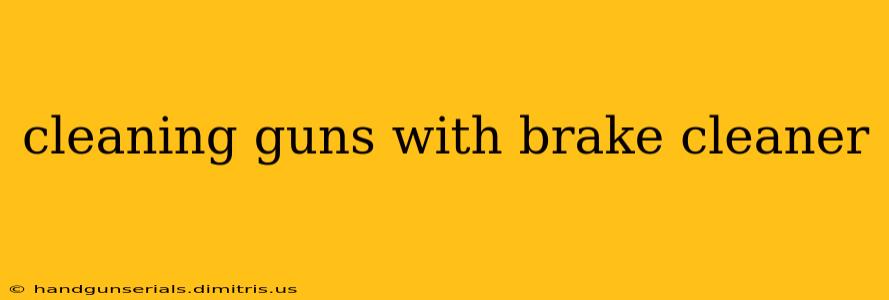Cleaning firearms is crucial for maintaining their functionality, safety, and longevity. While specialized gun cleaning solvents are readily available, some gun owners explore alternative methods, including using brake cleaner. This guide will delve into the use of brake cleaner for gun cleaning, outlining its potential benefits, significant drawbacks, and crucial safety precautions. It's important to stress that this method is controversial and should only be considered after careful consideration of the risks.
Why Some Use Brake Cleaner for Gun Cleaning
Brake cleaner's appeal lies in its potent ability to dissolve grease, oil, and carbon residue—common contaminants found in firearms after use. Its fast-evaporating nature also promises a quick cleaning process. However, these perceived advantages are significantly outweighed by the inherent dangers.
Perceived Benefits:
- Fast evaporation: Brake cleaner dries quickly, potentially speeding up the cleaning process.
- Effective solvent: Its strong solvent properties effectively remove stubborn grime.
The Significant Risks of Using Brake Cleaner on Firearms
Despite its cleaning power, using brake cleaner on firearms presents considerable risks that far outweigh any perceived benefits.
Potential Damage:
- Damage to internal components: Brake cleaner's strong solvents can damage polymers, rubbers, and certain finishes found in modern firearms. This can lead to malfunctions, reduced accuracy, and even premature wear. Certain parts, like seals and o-rings, are especially vulnerable.
- Corrosion: While brake cleaner dries quickly, residual chemicals can contribute to corrosion over time, particularly in humid environments. This is especially true for ferrous metals.
- Health Hazards: Brake cleaner fumes are toxic and inhaling them can cause respiratory problems, dizziness, and headaches. Always work in a well-ventilated area.
- Flammability: Brake cleaner is highly flammable. Avoid using it near open flames or sparks.
Alternatives to Brake Cleaner:
Specialized gun cleaning solvents are designed to effectively remove residue without damaging firearm components. These solvents are formulated to be less aggressive than brake cleaner, while still being effective. Using the correct lubricant after cleaning is also critical for maintaining functionality and preventing corrosion.
Safer Gun Cleaning Practices
Prioritize safety and proper firearm maintenance by adhering to these practices:
- Use dedicated gun cleaning solvents: Invest in high-quality gun cleaning solutions designed for the specific materials and types of firearms you own.
- Proper ventilation: Always clean your firearms in a well-ventilated area to avoid inhaling harmful fumes.
- Eye and respiratory protection: Wear safety glasses and a respirator to protect your eyes and respiratory system.
- Follow manufacturer's instructions: Consult your firearm's owner's manual for specific cleaning and maintenance instructions.
- Disassemble only if necessary: Avoid unnecessary disassembly. Focus on cleaning accessible areas.
- Proper storage: Store your firearms and cleaning supplies in a secure and appropriate location, away from children and unauthorized individuals.
Conclusion
While brake cleaner might seem like a quick solution, the risks associated with its use on firearms significantly outweigh any perceived benefits. Utilizing specialized gun cleaning solvents and following established safety procedures is the most responsible and effective approach to maintaining your firearm's condition and ensuring your safety. The potential for damage to your weapon and harm to your health makes using brake cleaner for gun cleaning a practice best avoided.

